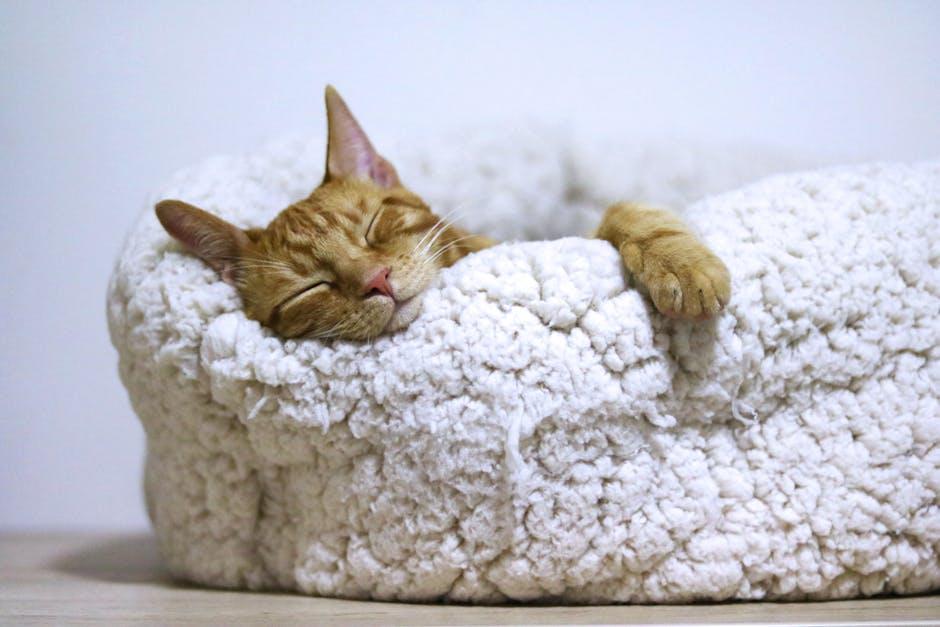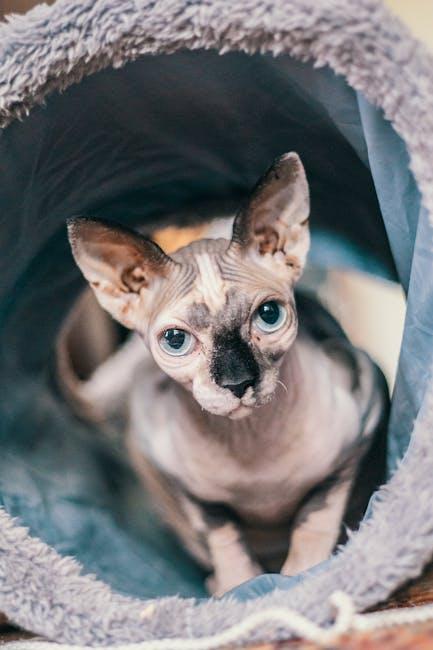Getting Started with Cat Care: A Beginner’s Guide
Hey there, future cat parent! 🐾 So, you’ve decided to welcome a furry little friend into your home? That’s pawsitively fantastic! Cats are quirky, cuddly, and a whole lot of fun, but thay also come with their own set of needs and quirks that can be a bit overwhelming at first. Fear not! Whether you’ve just adopted a tiny furball or are thinking about making that leap, this beginner’s guide is here to help you navigate the wonderful world of cat care. From choosing the right food to mastering litter box etiquette,we’ve got you covered. So, grab a cup of coffee (or a bowl of kibble, if you’d prefer), and let’s dive into the purrfect way to keep your feline friend happy and healthy! 🐱✨
Understanding Your Feline Friend’s Needs
Understanding your cat’s unique personality is essential in creating a nurturing environment for them. Unlike dogs, cats are more self-reliant creatures, often valuing their personal space.They communicate their needs not just through meows, but through body language and behaviors. Watch for signs of discomfort or happiness, like their tail position, ear movements, or how they react to your presence. Familiarizing yourself with these signals will not only help you respond appropriately but will also strengthen the bond between you and your furry friend.
Feeding and exercise are crucial components of your cat’s wellbeing.Here’s what to keep in mind:
- Diet: Ensure your cat’s diet is balanced, consisting of high-quality protein and essential nutrients.
- Hydration: Always have fresh water available; consider a water fountain as many cats prefer running water.
- Playtime: Engage your cat with interactive toys to encourage physical activity and mental stimulation.
- Safe Space: Provide them with cozy spots to retreat to, allowing them to feel secure.
| Need | Importance |
|---|---|
| Quality Food | Essential for health and energy |
| Toys | Helps in keeping them active and entertained |
| Litter Box | Crucial for hygiene and comfort |
| Vet Visits | Important for regular health check-ups |

Creating a Cozy and Safe Home environment
Creating a welcoming and secure haven for your feline friend is essential to ensure they feel at ease and thrive in their new home. Start by designating a agreeable space for your cat that includes a cozy bed,hiding spots like cardboard boxes or tunnels,and engaging toys to keep them entertained. Consider incorporating elements that cater to their natural instincts, like climbing shelves or cat trees, where they can observe their surroundings from a height. Additionally, it’s critically important to cat-proof your home to eliminate hazards, so make sure to secure loose wires, remove toxic plants, and store away small items that could be accidentally swallowed.
Adding a few personal touches can also contribute to a cozy atmosphere. Here are some ideas to help create that snug environment for your furry companion:
- Soft textiles: Use blankets and cushions to create a warm, inviting area.
- Warm lighting: Soft lamps or natural light can make the space feel more relaxed.
- Safe indoor plants: Select cat-pleasant plants to enhance your space without risking your cat’s health.
- Lavender or chamomile: These soothing scents can help cultivate calmness in the home.
Ensuring your cat’s environment is not just cozy, but also safe, is basic. Pay attention to common household dangers and create a protective zone. Here’s a simple table to guide you on how to identify and mitigate potential risks:
| Risk | Solution |
|---|---|
| Corded blinds | Use cord wraps or choose cordless options. |
| Toxic plants | Replace with pet-friendly varieties. |
| Small objects | Keep them out of reach or in closed containers. |
| Open windows | Install screens for ventilation without risk. |

Choosing the Right Food and Nutrition for Your Cat
When it comes to your feline friend, choosing the right food isn’t just about picking a brand off the shelf. It’s essential to consider your cat’s age, weight, activity level, and specific health needs. Cats are obligate carnivores, meaning their diet relies heavily on meat. Look for high-quality ingredients that feature real meat as the first ingredient. here are some things to keep in mind:
- Protein content: Aim for a food that has a minimum of 30% protein for adult cats.
- Life stage: Kittens, adults, and seniors all have different nutritional requirements.
- Grain-free options: Some cats may thrive on grain-free formulations, while others do well with grains.
- Treats and supplements: Use these sparingly and pay attention to potential allergens.
To make things easier, consider a few popular brands known for their high-quality cat food. Here’s a quick comparison of top options that cater to different needs:
| brand | Type | Protein % | Life Stage |
|---|---|---|---|
| Royal Canin | Dry/Wet | 40% | All Life Stages |
| Blue Buffalo | Dry | 32% | Adult |
| Hill’s Science Diet | Wet | 28% | Senior |
Ultimately, it’s always an excellent idea to consult with your vet when making critically important changes to your cat’s diet. they can help tailor a nutritional plan that suits your furry companion’s unique needs and lifestyle.

Grooming Tips and tricks to keep Your Cat Happy and Healthy
Keeping your feline friend happy and healthy starts with proper grooming,which not only helps maintain their physical appearance but also strengthens the bond between you and your kitty. Regular grooming sessions can help reduce shedding and hairballs, and it’s an excellent way to spot potential health issues early.Here are some essential grooming tools to keep on hand:
- Curry combs – Great for loosening and removing loose fur.
- Metal combs – Perfect for getting rid of tangles and mats.
- Hair clippers or scissors – For those occasional trims around sensitive areas.
- Nail clippers – Essential for keeping those claws in check.
- Cat toothbrush and toothpaste – Helps maintain dental health.
Establishing a grooming routine can make it easier for both you and your cat. Aim for a few minutes of brushing at least once a week, and don’t forget to reward your cat with treats or praise to make grooming a positive experience.For cats that dislike water, consider dry shampoo options available, which can provide cleanliness without the fuss of a bath. Additionally, always keep an eye out for signs of discomfort—if your cat seems anxious or agitated, take a break and try again later. Here’s a simple schedule to maintain:
| Task | Frequency |
|---|---|
| Brushing | Once a week |
| Nail trimming | Every 2-4 weeks |
| Bathing | As needed |
| Teeth brushing | 2-3 times a week |
Q&A
Q&A: Getting Started with Cat Care – A Beginner’s Guide
Q1: What essential supplies do I need for my new cat?
A1: Great question! Before bringing your furry friend home, grab the basics: a litter box and cat litter, food and water dishes, high-quality cat food, a scratching post, toys, a cozy bed, and a collar with an ID tag. Don’t forget a brush and some nail clippers to keep your kitty looking sharp!
Q2: How do I choose the right food for my cat?
A2: Cats are obligate carnivores, which means they need meat to thrive. Look for high-quality commercial cat food that lists meat as the first ingredient. You can go with dry kibble, wet food, or a mix of both! Just be mindful of portion sizes – check your cat’s weight and age to ensure you’re feeding them the right amount.If in doubt, a chat with your vet can help you decide!
Q3: What about litter? Best options?
A3: Ah, the litter dilemma! There are several types to choose from: clumping, non-clumping, crystal, biodegradable…The list goes on! Clumping litter makes it easier to scoop, while non-clumping options can be more budget-friendly. Try a few types to see which you and your cat prefer – it’s a pretty personal choice!
Q4: How can I keep my cat entertained?
A4: Cats need mental and physical stimulation to stay happy! Invest in a variety of toys like feather wands,rolling balls,and puzzle feeders. Rotate toys regularly to keep things fresh, and consider creating a play area with climbing shelves or cat trees. Don’t forget about good old-fashioned interactive playtime with you – that’s a surefire way to bond!
Q5: How do I introduce my new cat to my home?
A5: Take it slow! Start by setting up a designated space,like a quiet room with their essentials.Let them explore at their own pace. Give them a few days to adjust to the new environment before introducing them to the rest of your home. If you have other pets, do gradual introductions to help everyone feel comfortable – maybe starting with some sniffing through a door or a baby gate!
Q6: Do I need to take my cat to the vet right away?
A6: Yep, getting a vet check-up is super important! It’s good to make sure your new kitty is healthy and up-to-date on vaccinations. Establishing a vet relationship early on can help identify any health issues and get advice on spaying/neutering, flea control, and general care.
Q7: How frequently enough should I groom my cat?
A7: Grooming depends on your cat’s coat type! Short-haired cats tend to need less grooming – a quick brush once a week should do. Long-haired beauties, on the other hand, might benefit from daily brushing to prevent mats. Plus, grooming is a great way for you and your kitty to bond – it’s like a little spa day!
Q8: What should I do if my cat scratches furniture?
A8: Scratching is totally normal behavior for cats—it helps them stretch their muscles and keep their claws healthy! To protect your furniture, invest in scratching posts and place them near the areas where your cat likes to scratch. You can also use cat-safe deterrent sprays on furniture or cover them with protective materials until your cat gets the hang of where they should scratch!
And there you have it, folks! Cat care doesn’t have to be overwhelming.With the right supplies, a little patience, and plenty of love, you’ll be well on your way to being the cat parent of the year. Happy cat parenting! 🐾
Wrapping Up
And there you have it, folks! Starting your journey into the wonderful world of cat care doesn’t have to be overwhelming. With a little patience, a sprinkle of love, and these tips in your back pocket, you’ll be well on your way to becoming the purr-fect cat parent. Remember, every kitty is unique, so take the time to get to know your furry friend and enjoy the quirks that come with them.Whether you’re adopting a curious kitten or a wise older cat, the bond you build will be truly rewarding. Don’t forget to share your cat-tastic adventures with fellow cat lovers; we’re all in this crazy cat game together!
Now, go give your furball a scratch behind the ears, pour them a tasty treat, and dive into your new role as a cat caregiver. Happy cat caring! 🐾










